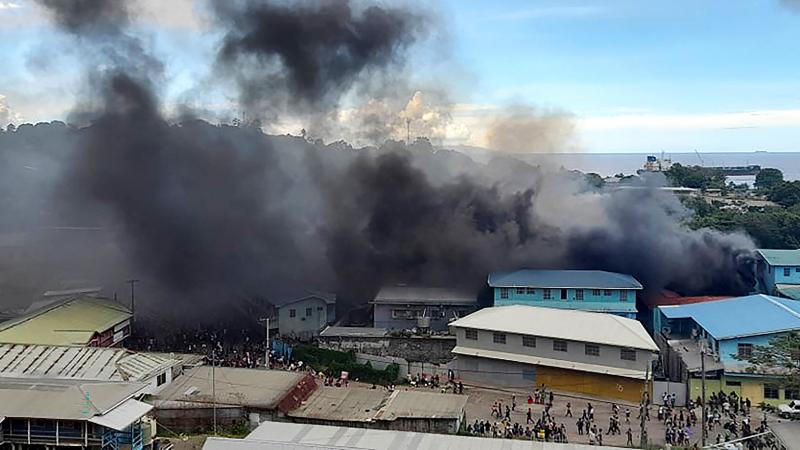Rioters torched buildings in the Solomon Islands’ capital of Honiara yesterday, targeting the city’s Chinatown district in a second day of anti-government protests.
Eyewitnesses and local media reported that crowds had defied a government lockdown to take to the streets. Live images showed several buildings engulfed in flames and plumes of thick black smoke billowing high above the capital.
It followed widespread disorder on Wednesday, when demonstrators attempted to storm parliament and depose Solomon Islands Prime Minister Manasseh Sogavare.

Photo: AFP
Businesses operated by Honiara’s Chinese community were looted and burned, prompting Beijing’s embassy to express “serious concerns” to the Solomons’ government.
The embassy “made representations requesting the Solomon Islands to take all necessary measures to strengthen the protection of Chinese enterprises and personnel,” it said in a statement.
Sogavare said his government was still in control.
“Today I stand before you to inform you all that our country is safe. Your government is in place and continues to lead our nation,” Sogavare said, adding that those responsible “will face the full brunt of the law.”
After failing to break into parliament on Wednesday, the rioters regrouped a day later, running amok in the Chinatown area and ransacking a police station, a local resident said.
The man, who did not want to be named, said police had erected roadblocks, but the unrest showed no sign of abating.
“There’s mobs moving around, it’s very tense,” he said, as local media reported looting and police using tear gas.
Most of the protesters in Honiara are reportedly from the neighboring island of Malaita, where people have long complained of neglect by the central government.
The island’s local government also strongly opposed the Solomons’ decision to switch diplomatic allegiance from Taiwan to China in 2019, in a move engineered by Sogavare, who critics say is too close to Beijing.
Opposition leader Matthew Wale called on the prime minister to resign, saying frustration at controversial decisions made during his tenure had led to the violence.
“Regrettably, frustrations and pent-up anger of the people against the prime minister are spilling uncontrollably over onto the streets, where opportunists have taken advantage of the already serious and deteriorating situation,” Wale said in a statement.
Similar inter-island rivalries led to the deployment of an Australian-led peacekeeping force in the Solomon Islands from 2003 to 2017, and the unfolding situation is being closely monitored in Canberra and Wellington.
New Zealand’s foreign ministry said yesterday it had not been approached by the Solomons’ government for assistance. Australian officials did not immediately respond to requests for comment.
There was rioting following general elections in 2006, with much of Honiara’s Chinatown razed amid rumors that businesses with links to Beijing had rigged the vote.
Sogavare said those involved in the latest unrest had been “led astray” by unscrupulous people.
“I had honestly thought that we had gone past the darkest days in the history of our country,” he said, adding that these events “are a painful reminder that we have a long way to go.”
“Hundreds of citizens took the law into their own hands today. They were intent on destroying our nation and ... the trust that was slowly building among our people,” he said.

Yemen’s separatist leader has vowed to keep working for an independent state in the country’s south, in his first social media post since he disappeared earlier this month after his group briefly seized swathes of territory. Aidarous al-Zubaidi’s United Arab Emirates (UAE)-backed Southern Transitional Council (STC) forces last month captured two Yemeni provinces in an offensive that was rolled back by Saudi strikes and Riyadh’s allied forces on the ground. Al-Zubaidi then disappeared after he failed to board a flight to Riyadh for talks earlier this month, with Saudi Arabia accusing him of fleeing to Abu Dhabi, while supporters insisted he was

The Chinese Embassy in Manila yesterday said it has filed a diplomatic protest against a Philippine Coast Guard spokesman over a social media post that included cartoonish images of Chinese President Xi Jinping (習近平). Philippine Coast Guard spokesman Jay Tarriela and an embassy official had been trading barbs since last week over issues concerning the disputed South China Sea. The crucial waterway, which Beijing claims historic rights to despite an international ruling that its assertion has no legal basis, has been the site of repeated clashes between Chinese and Philippine vessels. Tarriela’s Facebook post on Wednesday included a photo of him giving a

‘MOBILIZED’: While protesters countered ICE agents, Minnesota Governor Tim Walz activated the state’s National Guard to ‘support the rights of Minnesotans’ to assemble Hundreds of counterprotesters drowned out a far-right activist’s attempt to hold a small rally in support of US President Donald Trump’s latest immigration crackdown in Minneapolis, Minnesota, on Saturday, as the governor’s office announced that National Guard troops were mobilized and ready to assist law enforcement, although not yet deployed to city streets. There have been protests every day since the US Department of Homeland Security (DHS) ramped up immigration enforcement in the Twin Cities of Minneapolis and Saint Paul by bringing in more than 2,000 federal officers. Conservative influencer Jake Lang organized an anti-Islam, anti-Somali and pro-US Immigration and Customs Enforcement

NASA on Saturday rolled out its towering Space Launch System (SLS) rocket and Orion spacecraft as it began preparations for its first crewed mission to the Moon in more than 50 years. The maneuver, which takes up to 12 hours, would allow the US space agency to begin a string of tests for the Artemis 2 mission, which could blast off as early as Feb. 6. The immense orange and white SLS rocket, and the Orion vessel were slowly wheeled out of the Vehicle Assembly Building at the Kennedy Space Center in Florida, and painstakingly moved 6.5km to Launch Pad 39B. If the